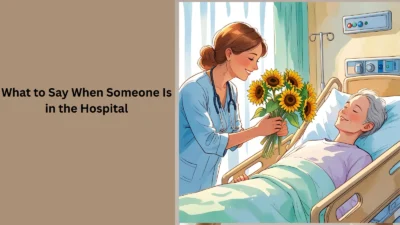Losing someone we love is one of the most heart-wrenching experiences we can face. Whether it’s the loss of a close friend, family member, or colleague, we often find ourselves at a loss for words. So, when someone dies, what to say can be a question that leaves us feeling uncertain.
In moments of grief, our instinct is to offer support, but finding the right words can feel daunting. What can you say that brings comfort without feeling too distant or cliché?
This article will guide you through different ways to express sympathy, support, and love during these difficult times.
Acknowledge the Pain
One of the first things to do when someone dies is simply to acknowledge the pain. Grieving is personal, and recognizing the pain that the person is feeling shows that you care deeply about their loss.
Example:
“I can’t imagine the pain you’re going through, but I want you to know that I am here for you, no matter what you need.”
What not to say: Avoid statements like, “They are in a better place” as it might come across as dismissive of the person’s grief.
Offer Your Support
During a time of loss, your presence can be a source of comfort. Offering specific support, whether it’s running errands, helping with funeral arrangements, or simply being a shoulder to lean on, can be incredibly meaningful.
Example:
“If you need help with anything, whether it’s making meals, or even just someone to talk to, I’m here.”
What not to say: “Let me know if you need anything,” can be too vague. People grieving might not feel comfortable reaching out for help, so be more specific.
Share Fond Memories
Sometimes, sharing a memory about the deceased can provide a sense of relief. It allows the person to reminisce and honor their loved one’s life and legacy.
Example:
“I’ll always remember the time when [deceased’s name] made everyone laugh at [event]. They had such a great sense of humor.”
What not to say: Refrain from turning the conversation into stories about your own grief. The focus should remain on them and their loss.
Be Honest, but Kind
It’s okay to express your own emotions, as long as you’re sensitive to the person’s needs. Sometimes, just sharing that you don’t have the right words to say can be comforting in itself.
Example:
“I wish I knew the right words to make this easier, but please know that I am so deeply sorry for your loss.”
What not to say: “I know how you feel,” can be frustrating for someone grieving, as every experience of loss is unique.
Respect Their Process
Everyone processes grief differently. It’s important to recognize that they might need space or they might want to talk about their loss for hours. Be patient and let them guide how they want to grieve.
Example:
“I know there’s no timeline for grief. I’m here when you’re ready to talk or just sit in silence.”
What not to say: “It’s time to move on,” or anything that suggests they should be healing faster than they are.
The Right Words Can Make a Difference
In times of loss, the right words can offer comfort, solace, and support. Being there for someone is sometimes more important than the specific things you say. Empathy, sincerity, and patience can go a long way in providing the comfort that grieving individuals need.
Example:
“I’m thinking of you, and I’m here whenever you need me.”
What not to say: Avoid making it about yourself, such as saying, “I know exactly how you feel.” It’s important to center the conversation on the grieving person’s experience.
Conclusion
When someone dies, knowing what to say is a delicate task, but your words can be a source of comfort in the grieving process. When someone dies, what to say should always come from a place of genuine empathy and kindness.
By acknowledging the pain, offering specific help, and being a patient listener, you can provide much-needed emotional support to those who are grieving.




